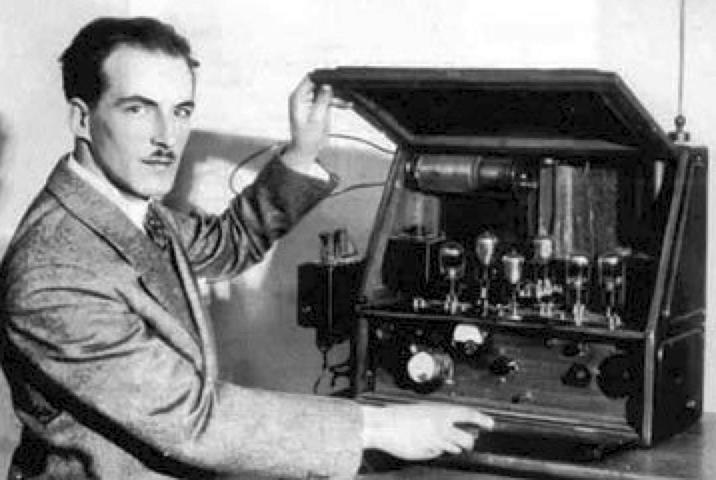
If you have ever seen the 1951 version of The Day The Earth Stood Still you will probably remember the sound track and understand why the instrument that created it, a Theremin, has been described as a cello crying because it is in a mist and cannot find its way home. But the sound made by the Theremin is nothing like as strange as the story behind its creator.
Almost everything that is said about Leon Theremin is probably a lie. For example some years after he was said to have died he was found alive and still working. Theremin was a spook, a Soviet agent. According to some reports he worked for the KGB until 1966. One thing we do know to be true is that he was passionately interested in the science of radio transmission and reception as long ago as the Second World War. His musical instrument works by directing an intense radio beam which is reflected by the hand of the performer. The beam is then received and converted into sounds in much the same way as a conventional radio gets a signal and turns it into something you want to listen to. If you think the Theremin is exotic, think again.
You probably have something very similar in your pocket: a contactless bank or credit card. It works by sending a signal when a radio wave is directed at it. The card itself is completely passive. There's no power source in it. It only operates when it picks up the radio beam. Leon Theremin, or his estate, probably never received a penny for the idea; but do not feel too much sympathy for him.
His main idea was something that was intended to help the Soviet Union win the battle against its enemies and has turned out to be surprisingly dangerous. The first example to come to light was in the Great Seal behind the American Ambassador's desk in the Moscow Embassy in 1950. What it did was transmit any sounds it picked up, but only while a radio beam was directed at it (in the case of the Moscow Embassy, from outside the building). Although the Americans discovered what was called The Thing, it was actually MI5 who figured out in 1951 how it worked and as a consequence were able to build their own version of the listening device. At the time the British spooks needed a success because the Burgess and Maclean defections to the Soviets had severely damaged its reputation.
The technology has been used by the Brits, the Americans, the Russians and very probably others like the Cubans.
A year ago (February 2022) the Americans admitted that what is described as the Havana Syndrome, a mystery ailment that causes a painful sound in the ears, fatigue and dizziness, was real. The syndrome had struck down 1,000 diplomats and spooks, at least a fifth of whom were American. A BBC report at the time speculated that the Syndrome was caused by either a weapon of some kind or surveillance.
The American Federal Communications Commission says that more research is needed on potential damage of radio waves to humans, but it notes that the eyes and the testes are known to be particularly vulnerable to high RF transmissions. It would be interesting to find out if there were any women amongst the 1,000 who have come down with the Havana Syndrome.
FCC also mentions that the US Department of Defense has extensive military interest in using RF equipment such as radar and other relatively high-powered radio transmitters for routine military operations. Could some of those routine operations include surveillance? Despite the lack of clarity over who or what is causing the illness, the American government decided to pick up the tab for its employees who suffer from the Syndrome. Joe Biden signed a law that entitles the heads of the CIA and State Department to provide financial compensation to those US government employees who have been harmed by the syndrome, in February 2022.
A surprisingly generous thing to do, unless the Americans know something they are not prepared to tell the rest of us.
| Headline | Date | Address |
|---|---|---|
| Spooks confess they are causing illness | February 3 , 2022 | http://www.brind.uk/Brind/2022/20220203.html |
| Spies: don't they make you sick! | October 25, 2021 | http://www.brind.uk/Brind/2021/20211025.html |
| Havana syndrome reported at US embassy in Colombia | October 13, 2021 | https://www.bbc.co.uk/news/world-us-canada-58893344 |
| Theremin: An Electronic Odyssey (Documentary by Steven M Martin) | https://www.imdb.com/title/tt0108323/ | |
| Leon Theremin | https://en.wikipedia.org/wiki/Leon_Theremin | |
| FCC | https://www.fcc.gov/engineering-technology/electromagnetic-compatibility-division/radio-frequency-safety/faq/rf-safety | |
| Havana Syndrome may be caused by ‘directed energy’ | 2 February 2022 | https://www.bbc.co.uk/news/world-us-canada-60237839>https://www.youtube.com/watch?v=w5qf9O6c20o |
| The Thing (listening device) | https://www.youtube.com/watch?v=w5qf9O6c20o | |
| Leon Theremin playing his own instrument | https://www.youtube.com/watch?v=w5qf9O6c20o | |
| The (electronic) magic of the dark side | October 12, 2021 | http://www.brind.uk/Brind/2021/20211012.html |
| The Day The Earth Stood Still - "Prelude and outer space" performed on the theremin (Coralie Ehinger - Therminal C) | https://www.youtube.com/watch?v=5VQgImg15sQ | |
| Peter Wright/ Paul Greengrass Spy Catcher (pages 20, 116, 292) | ISBN: 0-85561-098-0 |
Jonathan Brind